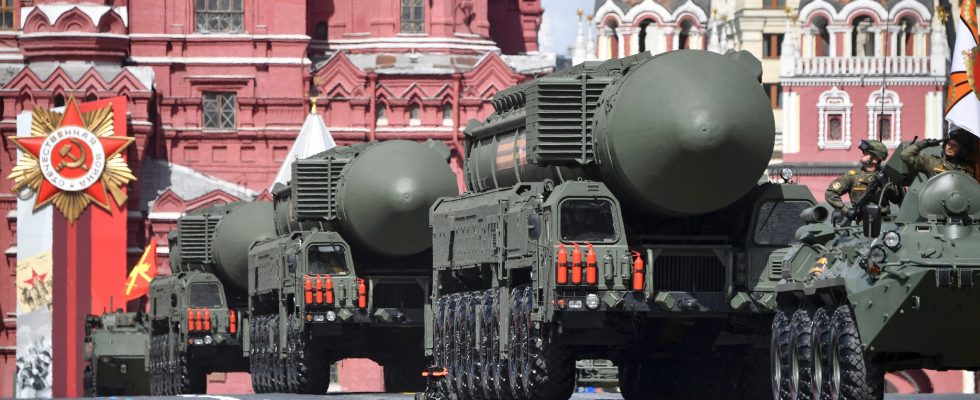Threats to the flagship event celebrating “Victory Day”. Certainly, the great military parade on May 9 celebrating the victory over Nazi Germany in 1945, in Red Square, is maintained in Moscow despite the drone attack on the Kremlin that Russia attributes to Ukraine. “The parade will take place. There is no change in the program,” presidential spokesman Dmitry Peskov said on May 3, quoted by Russian news agencies.
But, according to the British Ministry of Defence, the program would have actually been redesigned by the authorities. “The Victory Day celebration in Moscow is expected to continue, but on a smaller scale. The reception of Russian President Vladimir Putin after the parade will not take place,” the ministry wrote in its latest intelligence briefing on Saturday. May 6.
The traditional Immortal Regiment March, “where family members display photographs of deceased World War II veterans, associated with VE Day, has also been cancelled, the UK Ministry of Defense says. following the recent cancellation of the International Military Games hosted by Russia.”
Six regions and twenty-one cities have already canceled
In this context, 21 Russian cities had already announced the cancellation of similar celebrations. They all invoke security problems, specifies the British Ministry of Defence. This was the case, recently, of the governor of the Saratov oblast; previously from those of the Belgorod, Kursk, Voronezh, Orel and Pskov regions, as well as the Russian-occupied Crimean peninsula, relates the Guardian.
“There will be no parade so as not to provoke the enemy with a large number of equipment and military personnel in the center of Belgorod,” Russian governor of the Belgorod region Vyacheslav Gladkov said in April. As specified Business Insiderthe Washington-based Institute for the Study of War (ISW), said on May 4 that Russian officials were likely using the supposed attack on the Kremlin to cancel additional parades that were due to take place on May 9.
Russia’s “increasing vulnerability”
For the British Ministry of Defence, “the timing of the drone strike on the Kremlin a few days before VE Day shows Russia’s growing vulnerability to such attacks and has almost certainly heightened the leaders’ perception of the threat Russians on the events of Victory Day”. Furthermore, “the potential for protests and discontent over the war in Ukraine also likely influenced the calculation of the Russian leadership.”
One of the main points of discontent is the very high death toll that Russia has suffered since the start of the invasion of Ukraine on February 24, 2022. The White House said this week that 20,000 Russian troops have been killed in the past five months alone. The Institute for the Study of Warfare also says these scaled down parades are because “celebrations honoring fallen service members could become a potential source of national backlash due to the high number of casualties. Russians in Ukraine”.
Enhanced security measures
Speaking to reporters on May 2, Vladimir Putin’s spokesman Dmitry Peskov stressed that the security services were “doing everything necessary to ensure security” for May 9. Security measures will be “strengthened”, he assured. For the Russian authorities, the challenge is to ensure that it goes off without a hitch. “Incidents (during these demonstrations) are not desirable because they would disrupt the achievement of propaganda objectives and reduce the feeling of security”, analysis with AFP Andreï Kolesnikov, of the Carnegie analysis center.
Usually, these military parades, attended by thousands of families, are one of the major annual events of Vladimir Putin’s regime. Since coming to power, he has established a 1945 victory cult to stir up patriotic feelings and bolster his legitimacy by posing as the heir to Soviet power. “It’s the only ‘putty’ that unites the nation,” said Andrei Kolesnikov.
“And this celebration is now doubly important, because it is crucial for Vladimir Putin to insert into the collective consciousness this simple, but crazy idea that the special operation (in Ukraine) is an extension “of the war against Adolf Hitler, he judges. The Russian power does indeed cease to draw a parallel between the “Great Patriotic War” and the offensive in Ukraine, claiming to be fighting there “neo-Nazis” supported by Westerners.
May 1st already impacted
In 2022, during a speech on May 9, Vladimir Putin said that the current Russian army was fighting in Ukraine “so that there is no place in the world for butchers, murderers and Nazis” . “Victory will be ours, as in 1945,” he said at the time.
No parade marking the 1st of May had already taken place in Moscow because of a “high” terrorist risk. “There will be no parades and rallies in the capital, but a solemn meeting is planned”, warned on April 14 Alexander Cherchoukov, vice-president of the Federation of Independent Trade Unions of Russia, quoted by the agency of Tass press. The decision had been taken by the authorities because “the level of terrorist danger is higher, even in regions far from the places of the ‘special military operation'”, he had justified.
The May Day celebrations, which are very official in Russia, are notably organized by unions loyal to the Russian authorities. The Russian authorities have been insisting since the April 2 attack, which killed a military blogger in Saint Petersburg, that the terrorist risk has increased, accusing Ukraine, the West and the Russian opposition of wanting to orchestrate attacks.
